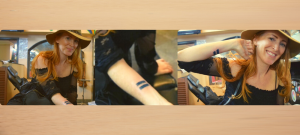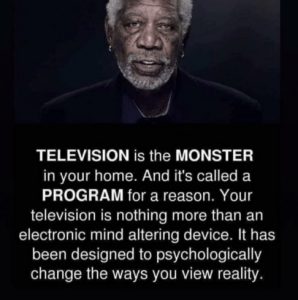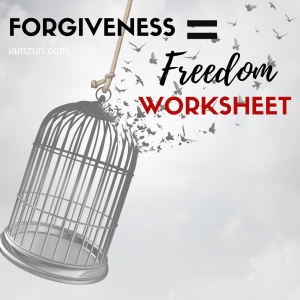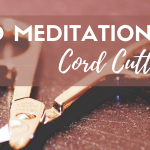Forgiveness Equals Freedom
Episode 7 is here!
Show description:
Have you ever held onto a grudge? Are you staying stuck in an old memory loop of something that hurt you? Maybe you’re harboring pain from something that happened to you as a child and you just can’t seem to let it go. The EmPOWERment Couple dives deep into forgiveness in this episode and provide you with the science of forgiveness, the tools to finally forgive and let go along with a bonus guided cord-cutting meditation led by Mikey. Maybe you’re having a hard time recovering in your marriage or relationship from some betrayal or you’re power struggling and hurting each other in the process. Whatever it is, it’s time to squash all of that and learn to forgive and forge forward. As Mikey says, “the only way to settle the score is to remove the score.”
Show Blog:
“The stupid neither forgive nor forget; the naive forgive and forget; the wise forgive but do not forget.” — Thomas Szasz
We had a request from our pod fam to talk about forgiveness and today we are doing that in three simple ways.
- What is forgiveness
- Reasons to forgive
- What’s on the other side of forgiveness?
We are going to talk about it in three unique ways as well.
- Forgiving the unforgivable
- Forgiveness as a gift
- Forgiving yourself
As a couple, we’ve been through so many obstacles and we met at a time when we weren’t ready for a husband or a wife. We were barely adults and naive in every sense of the word. With that immaturity came a lot of mistakes and growing pains. We also had a U-haul-sized-load of baggage from our parent’s divorces to bad experiences with ex-boyfriends or girlfriends and zero concept of a “healthy relationship.”
Our weak ways of dealing with our pain meant we had to become good at forgiving things that had happened to get what we wanted, which ultimately was to be happy together. One of the most pivotal arguments we had came after a relationship separation where we realized we were competing with one another and power struggling.
Once we realized that, we made the concerted effort to commit to becoming equal. We had supported equality in all of our work and clearly believed that all humans are equal, but at home, we were fighting over work-life balance, who was doing what and wanting to blame and control the other person in our attempt at finding the reason behind our bitterness. What we found is that our roles were so far from what we envisioned for ourselves that the expectation was creating bitterness and distance with the person we wanted to be closest to. It is silly, but it’s extremely common. Forgiveness is one of the highest forms of love and if you haven’t mastered it, it’s likely causing some problems in your relationships.
“There is no love without forgiveness, and there is no forgiveness without love.” — Bryant H. McGill
During this phase, we solidified our commitment to one another by stopping the return to memory lane, our greatest hits so to speak of bad things we had done to one another while growing up together. The kitchen sink arguments were plenty. Which made for good makeup sex but hurt our ability to trust one another.
 We decided after a year of extreme growth and reconnection, that we’d get a tattoo of an equal sign to deepen our commitment to our current state and to recognize the eleven years we took to get here. It also then became the name of Zuri’s third album ELEVEN. We really put each other through the worst of the worst as we were growing. This symbolized that no matter what we did, we needed to recommit and enter this phase as equals if we had any shot of success as a couple.
We decided after a year of extreme growth and reconnection, that we’d get a tattoo of an equal sign to deepen our commitment to our current state and to recognize the eleven years we took to get here. It also then became the name of Zuri’s third album ELEVEN. We really put each other through the worst of the worst as we were growing. This symbolized that no matter what we did, we needed to recommit and enter this phase as equals if we had any shot of success as a couple.
The only way to settle the score is to remove the score. At this point, we were tied at zero and ready to start playing life for fun, and help each other cross the finish line.
Let’s dive into the misconceptions about forgiveness
Forgiving the unforgivable
Usually, when you talk about forgiveness there’s a lot of comments from people that say forgiveness is impossible when you can’t forgive the unforgivable. Usually, people reference the extremes, like serial killers or Hitler. Other people reference children dying from cancer or kidnappers. Some people object to forgiveness, citing the need for justice after a wrong has been committed. Other people say you can still forgive people even if you punish them for what they did.
There are countless extremes but rather than share all of those with you here, we want to focus on what forgiveness actually is so that you’re not putting up resistance towards a life-changing decision like forgiving.
What Is Forgiveness
The Greater Good Mag out of UC Berkeley states: “Psychologists generally define forgiveness as a conscious, deliberate decision to release feelings of resentment or vengeance toward a person or group who has harmed you, regardless of whether they actually deserve your forgiveness.”
“I think the first step is to understand that forgiveness does not exonerate the perpetrator. Forgiveness liberates the victim. It’s a gift you give yourself.” — T. D. Jakes
Let’s review what forgiveness does and does not do.
Forgiveness Does Not:
- Forgiveness does not justify past actions.
- Forgiveness does not allow future actions.
- Forgiveness does not place you in a current position of weakness.
Forgiveness Does:
- Forgiveness does allow you to learn and grow from past actions.
- Forgiveness does empower you to avoid future actions.
- Forgiveness does place you in a current position of balance and happiness.
Let’s review the effects of forgiveness on the physical body
A pair of researches developed the Transgression Narrative Test of Forgiveness (TNTF). Basically it is a questionnaire that defines an individual’s pattern of forgiveness across five situations, providing you with important clues about your general willingness to forgive other people or your dispositional forgiveness. Across the various studies that they did to develop and validate this scale, which was published in the Personality and Social Psychology Bulletin, the evidence they discovered suggested that people who were disinclined to forgive were more likely to be prone to anger, anxiety, and other negative emotions. Furthermore, there seemed to be a small, positive relationship between willingness to forgive in these situations and the personality trait of agreeableness. Agreeable people are more good-natured, so this may suggest that forgiving people are also likely to be high in empathy, compassion, and trust.
What I gleaned from this super dense study, is that there are two outcomes that anyone can experience. We can forgive and experience high emotions such as empathy, compassion, and trust, or we can choose not to forgive and experience lowered emotions such as anger, anxiety, and self-loathing. It is a choice that we all make depending on what we value the most… to forgive and enjoy good feelings, or not forgive and continue to identify with and suffer through bad feelings.
If a family member or close friend is the person you’re looking to forgive I want to provide you with some more studies that suggest healthy relationships are good for your health so do the work to mend those relationships now. The quality of our relationships matters. For example, one study found that midlife women who were in highly satisfying marriages and marital-type relationships had a lower risk for cardiovascular disease compared with those in less satisfying marriages. Other studies have linked disappointing or negative interactions with family and friends with poorer health. One intriguing line of research has found signs of reduced immunity in couples during especially hostile marital spats.
Having a network of important relationships can also make a difference. A large Swedish study of people ages 75 and over concluded that dementia risk was lowest in those with a variety of satisfying contacts with friends and relatives.
Reasons To Forgive
Science says forgiveness is good for you!
In one study by Witvliet, Thomas E. Ludwig, and Kelly L. Vander Laan, 35 women and 36 men were asked to recall a real-life person who had hurt them and then reacts both in unforgiving and forgiving ways. Unforgiving thoughts triggered stress responses such as higher blood pressure and faster heart rates. Forgiving thoughts resulted in milder physiological stress responses. The researchers concluded that prolonged feelings of unforgiveness could be hazardous to one’s health.
Charlotte VanOyen Witvliet and her colleagues at Hope College in Michigan have shown. Writing in Psychological Science, these investigators reported a study on the physiological effects of forgiveness versus holding a grudge. Witvliet and her co-investigators theorized that forgiveness “may free the wounded person from prison of hurt and vengeful emotion, yielding both emotional and physical benefits, including reduced stress, less negative emotion, fewer cardiovascular problems, and improved immune system performance. “Researchers had 70 Hope College undergraduates remember a time in which they were hurt or mistreated by someone else. Over the course of the study, the participant rehearsed either forgiving that person or being unforgiving. Participants were told that being forgiving consisted of empathizing with the offender and being forgiving involved letting go of negative emotions toward the offender and cultivating conciliatory ones. Being unforgiving consisted of rehearsing the hurt and holding a grudge.”
Participants were encouraged to focus on the thoughts, feelings, and physical responses that would accompany each response. During the study, the participants remembered offenses that included rejections, lies, and insults from their friends, romantic partners, and family members. During the two-hour study, participants’ psychophysiological responses, emotional responses, and facial expressions were recorded. The results powerfully showed that forgiveness was associated with a healthier profile of emotional and physiological reactions, compared to unforgiveness. During the unforgiveness periods, participants reported feeling more negative, aroused, angry and sad, and less in control. In contrast, when asked to try to be forgiving, participants reported feeling more empathy and did report feeling more forgiveness.
Physiological measurements showed that during unforgiveness, participants showed greater corrugator EMG activity, which is a measure of tension in the brow area of the face – perhaps indicative of negative emotions. Skin conductance levels were lower in the forgiveness periods, indicating a less sympathetic nervous system arousal. Arterial blood pressure was also higher during the unforgiveness periods. Many of these changes persisted in the recovery period of the study.
In all, the emotional and physiological data suggest that a sustained pattern of unforgiveness over time could result in poorer health because of the negative psychophysiological states that accompany unforgiveness. Witvliet and colleagues believe that “although it is unlikely that the brief unforgiving trials in this study would have a clinically significant effect on health, we believe that the effects obtained in this study provide a conservative measure of effects that naturally occur during unforgiving responses to real-life offenders.”
Chances are that if you’re reading this, you have some forgiving to do or you know someone that does. There’s constant programming on tv asking you to pick a side and make one person wrong and one person right. So, no matter when you’re listening to this you are likely angry or hurt by some person, political figure, religious leader, racist, dirty police officer, looter, corporate giant, maybe someone who’s too liberal or too conservative, sexual offender, kidnapper, human trafficker or villain. This programming only aims to keep humanity divided.
 Those who run the hate programming are looking to divide us because that’s how they control us. My suggestion is that you do not divide yourself into for or against craziness and instead appreciate our unique offerings in this vast ecosystem. Take your power back and opt out of that programming. You will make an impact by focusing on solutions and modeling love rather than filling your mind with toxic programming meant to make you fat, sick, and depressed while the people that profit off of this get richer and simply do not care about you. If we unified as one race ad forgave one another for past harm we’d have much more power at hand in the present to create the world we want to see. As The EmPOWERment Couple, we aim to give you mind food to empower you.
Those who run the hate programming are looking to divide us because that’s how they control us. My suggestion is that you do not divide yourself into for or against craziness and instead appreciate our unique offerings in this vast ecosystem. Take your power back and opt out of that programming. You will make an impact by focusing on solutions and modeling love rather than filling your mind with toxic programming meant to make you fat, sick, and depressed while the people that profit off of this get richer and simply do not care about you. If we unified as one race ad forgave one another for past harm we’d have much more power at hand in the present to create the world we want to see. As The EmPOWERment Couple, we aim to give you mind food to empower you.
If you’re interested in knowing more about your willingness to forgive, take this forgiveness quiz from Berkeley.
Forgiveness is something we’ve had a lot of experience with and chose to study it and I write about my experiences personal experiences in my book. Mike shares one of his forgiveness journeys in the podcast and you can skip to that at around the 23:01 minute mark. One of the exercises we recommend is using this forgiveness equals freedom worksheet. It’s a free PDF that allows you to walk through all the steps of forgiveness.
 Click here or on the image to get the free PDF. If you’d like to listen to the exercise on the podcast skip to 30:50. We wanted to provide you with this exercise to help you fully understand yourself and the relationship you have with your pain. Please let us know if this exercise was helpful to you. Once you’re ready to practice forgiveness with the individual that harmed you, only then can you heal your pain using the tool of forgiveness. And when you can thank the person or situation for the lesson learned, you’ve completed the cycle of forgiveness. Congratulations!
Click here or on the image to get the free PDF. If you’d like to listen to the exercise on the podcast skip to 30:50. We wanted to provide you with this exercise to help you fully understand yourself and the relationship you have with your pain. Please let us know if this exercise was helpful to you. Once you’re ready to practice forgiveness with the individual that harmed you, only then can you heal your pain using the tool of forgiveness. And when you can thank the person or situation for the lesson learned, you’ve completed the cycle of forgiveness. Congratulations!
If you aren’t ready to forgive, review why you’d rather stay bitter and angry. And then give yourself time to repeat this after some time has passed and you have grown. The hardest work you’ll do in this life is likely letting go of a past thing that happened that you can no longer fix or heal. The healing is in recognizing it and putting it to rest. Let that thing die.
Forgiveness As A Gift To The Person, But Also A Gift To Yourself
Many might struggle with the relationship between forgiveness and punishment not realizing that rather than operating from the heart, they are operating from the mind and playing judge. This is how most people get stuck in staying angry and in fact use that anger as part of their personality and justify it with the bad thing that happened to them. The problem with this is that you’re giving all your power away to a thing or person that no longer exists in your current reality. Or maybe it’s something fresh that just happened. How many more times will you allow this thing or person to hurt you?
“To forgive is to set a prisoner free and discover that the prisoner was you.”
— Lewis B. Smedes
What’s on the other side of forgiveness?
Forgiveness = Freedom
The hardest person you’ll ever have to forgive is yourself. We carry so much weight around when someone has done something to us. I’m talking about a lifetime wasted on something that happened as a child. It’s not worth it.
As I said, my experiences with forgiveness have been my biggest lessons in this life. The most difficult challenge you’ll experience is that you’re no longer even mad at them but you’re mad at yourself and you need to forgive yourself. “An eye for an eye” is a reaction to being hurt, physically, or emotionally. The need for retaliation poisons our minds, and it takes hard work to finally be able to say “I forgive you.” My freedom from some things I’ve done to the people I love came from forgiving myself.
Cord Cutting
Only you can decide what needs to be forgiven or who needs to be forgiven. When this decision is made, you have the opportunity to cut the cord linking you, to that person or situation. I use the term cord much like an umbilical cord. The difference being that the cord connecting you to that person or situation or even to addiction is draining you of nutrients versus your receiving nutrients from it. We have provided you with a Cord Cutting guided mediation led by Mikey.
When you are ready, use it to let the person, situation, or issue you’re still hanging on to… go. We suggest that once you decide to use the cord-cutting tool, you employ the heart and silence the mind. Your body will know what changes it needs to make to feel better, while the mind will be busy justifying its reasons to stay the same. Holding a grudge never feels good and you may be doing it subconsciously, which is a process of the mind. You hold the pen to write your story, you also hold the scissors to cut out any characters or issues that you wish.
“In the path from victim to hero is a steady bridge called forgiveness.” -Mikey Star
At the end of this forgiveness journey, you may find yourself feeling lighter and excited about the new you. You may even find yourself, FREE!




